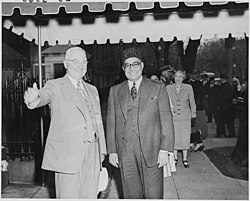State visit by Liaquat Ali Khan to the United States
The state visit of Liaquat Ali Khan to the United States from 3 May to 5 May 1950, was an official
President Truman had sent his personal aircraft, The Independence, to ferry the Pakistani prime minister from London to Washington, D.C., and accorded him the highest honour by personally welcoming him at the national airport, accompanied by his entire cabinet. A photograph from that time shows Truman and his wife smiling at the camera, surrounded his Pakistani guests and their wives in "Gharar" outfits in front of Blair House, the state guest house across the street from the White House. Liaqat Ali Khan was wearing a Western Suit with a "Jinnah" Karkuli cap.[1]
Upon Prime Minister
At home front, Prime Minister
Background

After the
The
Visit and aftermath

In a reference written by Kalim Bahadur in his book Democracy in Pakistan: Crises and Conflicts, Prime Minister Ali Khan quickly accepted the invitation and postponed his visit to Moscow.[6] On 3 May 1950, Prime Minister Ali Khan, the First Lady of Pakistan, Begum Ali Khan and the large civic-military delegation arrived to the United States via United Kingdom and their official flight landed at the New Orleans Airport, New Orleans, Louisiana.[7] Prime Minister Ali Khan was met with honour and received a warm welcome from the general American public; he was personally received by the President of the United States, Harry Truman. Upon reaching New York City, President Truman organised a parade and accorded the red-carpet treatment to welcome Ali Khan and his family.[8]
Ali Khan gave a lecture on
This visit not only enabled me to see the American people and their wonderful country but also gave me an occasion to inform the inhabitants of that country about the birth of Pakistan, its short but eventful history and the Islamic way of life adopted as an ideal by the people of my country
— Prime Minister Liaquat Ali Khan, 1950, source[5]
Criticism and politicisation
At home front, Prime Minister
In 1972, due to Prime Minister
Media gallery
-
Prime Minister Ali Khan speaking with the American public.
-
Prime Minister Ali Khan and First Lady Begum Ali Khan speaks with the faculty of MIT.
-
Vice-PresidentAlben Barkley explains the 1948 version US Seal.
References
- ^ Pasha, Shujan Nawaz (2008). Crossed Swords. Oxford University Press. p. 95.
- ^ Staff editor (6 October 2011). "Pakistan Chronicle's collection: Liaquat Ali Khan goes to the US (1950)". The Friday Times. Retrieved 25 March 2014.
{{cite news}}:|last=has generic name (help) - ^ Staff writer (17 October 2010). "The foreign policy of Liaquat Ali Khan". Dawn news foreign policy archives. Retrieved 25 March 2014.
- ^ Makhdumi, Umar M. (11 November 2011). "Liaquat Ali Khan's visit to US". Dawn News. Retrieved 25 March 2014.
- ^ a b c Aziz, Qutubuddin. "Special Edition: Quaid-i-Millat's visit to the United States The foundation of friendship and economic co-operation". Jang English Services. Archived from the original on 6 September 2008. Retrieved 25 March 2014.
- ^ ISBN 8124100837.
- ISBN 0313276021.)
{{cite book}}: CS1 maint: multiple names: authors list (link - ISBN 978-1477257098.
Further reading
- Bahadur, Kalim (1998). Democracy in Pakistan : crises and conflicts. New Delhi: Har-Anand Publications. ISBN 8124100837.



